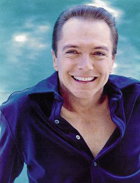
David Cassidy in the News
In A New Vein
Former Pop Music Stars Pump Life Into `Blood Brothers'
September 25, 1994
By Sid Smith
Chicago Tribune
DALLAS ó Looking much like a suburban housewife, she hit big with one of the most hummable pop tunes ever.
Five years later, when she was all but forgotten, he was suddenly everywhere.
Petula Clark arrived in 1965, the voice behind "Downtown" and sometimes a gracious presence on pre-"Monkees" teen TV-the likes of "Hullabaloo" and "Shindig." David Cassidy became an overnight teen idol and media sensation during his run on "The PartridgeFamily " from 1970 to 1974.
"I don't really like talking about myself," David Cassidy says as he plops down for his interview. "But you get used to it. I must have had some 10,000 of these."
In person, Petula Clark's manner is tentative, elliptical, riddled with "oh, well, whatever" sentence fragments. Underneath, you gradually realize, are nerves of steel and supreme self-confidence. In contrast, Cassidy is loquacious, solicitous and outgoing, hiding, he broadly implies, a deep-seated insecurity aggravated by his roller-coaster career.
They're united in one of the oddest success stories in show business today. Last season, a producer cast them (along with David's half-brother Shaun) as replacements in a struggling Broadway musical, hoping to run the show another five or so months.
They played, in fact, for 10, tripling box office overnight. The show, Willy Russell's dark social musical "Blood Brothers," survives on Broadway now without them, and they've gone on the road, opening a few weeks ago in Dallas to launch a 23-city tour set to play Chicago's Shubert Theatre beginning Tuesday.
In so many ironic ways, "Blood Brothers" is the perfect vehicle to re-launch a couple of once beloved, somewhat forgotten pop stars. Russell's strange, unclassifiable piece-Is it musical melodrama? Is it social commentary with incidental music?-boasts its own defiant, come-from-behind, comeback saga.
It tells the story of a British mother on the dole whose twins arrive at the end of a long line of children, at which time she's abandoned by her unemployed husband. Working as a domestic, she's persuaded to secretly give up one of the boys to her rich employer, who passes the child off as her own. Later, the two brothers meet and become playmates and friends in a stormy scenario that explores both genetic links and fiery class warfare.
Russell first wrote and staged the work in Liverpool more than 10 years ago. "Blood Brothers" made it to a brief West End production in 1983 and, though ignored by critics, racked up some impressive British awards after its closing.
The story ordinarily would have ended there. But a producer named Bill Kenwright became both a latter-day champion and a saving angel. He remounted "Blood Brothers" in the West End in 1988, and, again without what you'd call critical raves, the show sailed along on word-of-mouth, surviving in the West End to this day. While "Phantom of the Opera" and others were getting all the attention, "Blood Brothers" endured, less heralded but still very popular.
In 1993 Kenwright brought the show to Broadway with a British cast. When the time came for Broadway replacements, he hit on the idea of casting Clark and the Cassidy brothers. Clark herself says casting real-life half-brothers to play the fictional twins was a stroke of programming genius. "It got intense," she says, adding in a wry afterthought, "almost too intense, frankly."
For Cassidy, the whole experience has been a deferred chance to win respect. Now 44, he gets not only ample opportunity to sing, but also enough high-flown melodrama in the three-hour show to act up a storm, as well. He rolls around and hops about as a giddy young child (in much of the story, the adults playing the brothers portray them in childhood and as teenagers). As the lower-class brother who turns to crime, Cassidy rages with adult bitterness and pain.
Keith Partridge he isn't.
"I remember first wanting to be an actor when I was 3 1/2 years old," he says. "My father (Jack Cassidy) was an extremely talented Broadway musical performer who played in 35 or 40 Broadway shows. One night we drove home after going to one of his performances, and I remember asking him in the Lincoln Tunnel, `Can I be an actor, too?'
"My dad said, `Wait until you get out of high school," Cassidy continues. "So I did. I studied in New York, performed in a short-lived show ("The Fig Leaves Are Falling"), directed by George Abbott, and was spotted by a television producer. He lured me to Hollywood to test for a made-for-TV movie , and though I didn't get that part, I did guest spots on `Marcus Welby, M.D.,' `Bonanza' and a few other hit TV shows. I had already been on the cover of `Tiger Beat' before I got cast in `The Partridge Family,' " which by pure coincidence, he says, co-starred his real-life stepmother, actress-singer Shirley Jones.
"Of course, everyone knows what happened," Cassidy continues. "I took the job, though I wasn't thrilled about it. I still wanted to be a serious actor. But I was living in a rented house in Laurel Canyon with overturned orange crates for furniture. `I Think I Love You' sold 3 1/2 million copies, and my first three albums each went platinum. They were suddenly marketing my name and likeness-which they owned-everywhere, on lunchboxes, as dolls, on guitars.
"In a year, I went from being a serious young actor to being this thing. And it changed my life forever. In a lot of respects, it wrecked me. And in a lot of other ways, it has kept me going. The impact I've had on people's lives and their love has been extraordinary."
After "Partridge," Cassidy went into a self-imposed three-year retirement. Then, in 1976, his father, with whom he hadn't spoken in nine months, died suddenly in a fire. Theirs had been a troubled father-son relationship. "He was a raging alcoholic," Cassidy says. "We all suffered from that. No one more than Shirley, who finally left him, too. And he couldn't handle her success and certainly not mine."
In the late '70s, David Cassidy's own roller coast continued. He was nominated for an Emmy for a guest role in a "Police Story" episode, but then he fell into a rough period, plagued by an alcohol problem of his own and an inability to shed his teen-idol image. He began dabbling in theater, including an earlier Broadway revival of "Joseph and the Amazing Technicolor Dreamcoat"-immortal home to ex-teen idols, it seems. (He also did a run in the West End musical "Time" in the 1980s, coming to the attention of producer Kenwright.)
Cassidy is now on his third marriage and is father to a 3-year-old son. He can claim not only last year's book on his Partridge years, "C'mon Get Happy: Fear and Loathing on the Partridge Family Bus," but also credit as songwriter for the theme music for television's "The John Larroquette Show," which, tellingly, he was awarded by submitting a tape under a pseudonym.
"I have mixed feelings about the whole Keith Partridge thing in that it took me off the path I was on," Cassidy says. "Something was taken away, and you can never be that again-you can never be pre-fame. I have the same attitude now I had then. I don't want to be a teen star, and I never did."
Clark, by comparison, almost didn't have a choice. Fame came to her in her native Great Britain as a child star at age 7. Even by young adulthood, when she remained unknown here but had become a beloved singer in France, she'd been around forever. Show business is her life.
Then, in the early 1960s, a producer named Tony Hatch suggested she record a song called "Downtown."
"I was 32 or so at the time, and overnight I was a big hit in America, even though I'd never been here," she says. "It was difficult, in those days, to get me here, for that matter. I was still so booked, you see, in France and Europe. Just finding time to capitalize on the American success was very difficult."
The long string of catchy hits ("I Know a Place," "Don't Sleep in the Subway," "A Sign of the Times," "I Couldn't Live Without Your Love") and the somewhat saccharine image their happy-go-lucky lyrics created still come to mind with the name Petula Clark here. Clark saw it differently. "It was all very, very wonderful," she says of her '60s fame. "But it was just a small part of my own career, to me. I had started out before all that, and I've kept going on, in Europe, ever since."
In the late '60s, she starred in two Hollywood musicals, "Goodbye, Mr. Chips" and "Finian's Rainbow." Neither was a critical darling, and the latter especially came in for some rough pans, even though in it she serves as Fred Astaire's final on-screen partner. ("And I'm not that accomplished a dancer," she says.)
Meanwhile, she and her husband, Claude Wolff, a French record-company executive, were trying to raise a family. "It all got to be too much. We had a main house in Geneva, two other houses elsewhere in Europe, but all of my work was in California. I finally said either we move to America or I turn my back on it for a while, which is what I ended up doing.
`Then, in Europe, I got somewhat bored. I wish I was the type to stay home and cook or sew, but frankly I'm not." Her European concerts continue to be something of a small industry. But all these years she never seriously explored any kind of American comeback. She has never toured the U.S. until now, and when she joined "Blood Brothers" last season, she made her Broadway debut-at age 61.
"For years, I just didn't feel the time was right, somehow," says Clark. "I didn't want to be a part of the nostalgia craze. And I'm not. I gave a concert in New York before we left for this tour, and what happened then tends to happen in general. They start by wanting `Downtown'-I'd be lynched if I didn't sing it.
"But they leave remembering the Freddie Mercury songs I do or some other new material that's part of a new album."
Her long marriage to Wolff is now somewhat strained, she hints. She is considering a permanent move to the U.S., partly to be near two of her three grown children, who now live in Miami.
That seems appropriate, considering she's touring in a show all about family bloodlines. Meanwhile, her co-star is finally getting some grudging respect doing his father's business after decades of side-trips.
Despite the span of years-or maybe because of it-Americans seem to hold a reservoir of good will toward the ex-Keith Partridge and the "Downtown" diva.
"What I've learned, maybe the hard way," says Cassidy, "is that it's the work that matters, not the fame."
Says Clark: "It's fine while it lasts, and when it's over, something else will turn up. It always does."
